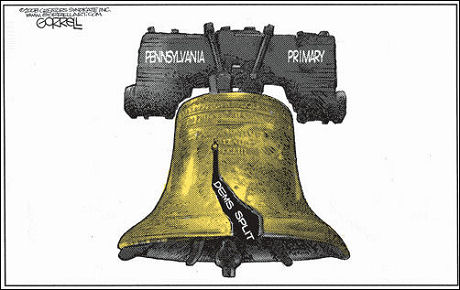Day: April 23, 2008
Art of the Practical
The closer Barack Obama gets to the Democratic nomination, the uglier this thing is getting in racial terms. That Republican-funded North Carolina TV attack ad I saw today that tried to “Willie Horton” Obama was nothing sort of breathtaking. When was the last time in which the racial-attitude cards from the hunkered-down regions were laid more plainly on the kitchen table? The early to mid ’60s? As one MSNBC commentator said today, there are people out there who “made up their minds about [voting for an African-American candidate] back in 1957.”
Is there any way to interpret Hillary Clinton‘s strategy but to say she’s clearly playing this situation (along with her ace-in-the-hole gender loyalty card) for all it’s worth? At the end of the day the ugly-duck reality is that Obama, who has to despise his opponent with every fibre of his being, may have no choice but to offer Clinton the Vice-Presidential spot. You don’t have to like or even respect someone to cut a deal with them. But would she take it?
Timing
This isn’t much, but the new trailer or Indiana Jones and the Kingdom of the Crystal Skull is done and should be debuting with Iron Man (Paramount, 5.1) if not before. I presume it will turn up online concurrently. The exact running time is 1 minute, 49 seconds.
Cruel and Unusual
Older guys can be ornery. They can be grumpy, irascible. Sometimes they lose it. My father, well into his 80s, has succumbed to this syndrome recently. Whatever it was that was bothering Peter Falk, running a story like this is predatory journalism at its worst.
Curious but Vital
Nobody in the world — nobody — throws brilliant, super-analytical lightning bolts from his own incredibly fickle and ferocious orbit like New York Press critic Armond White. Judgment! Judgment! He’s immensely readable, fearless, provocative. Film criticism today would be in a much poorer and less observant state without him. But he’s so alone now. He’s so up there and out there that he’s barely seems to be breathing the same common air or standing on any kind of recognizable terra firma. Not as currently constituted. You know what I mean by that.

In a perfectly reordered universe White would have written and ruled in the ’60s, ’70s and ’80s, when impassioned, super-charged eccentricity was more readily absorbed and in fact valued. In certain ways White’s writing reminds me of Manny Farber‘s, or the Cahier du Cinema scribblings of Francois Truffaut, Bertrand Tavernier and Jean-luc Godard. He’s a fascinating madman. Only White can say stuff that I find almost appalling (but always amusing) in its hermetic and secluded considerations, but at the same make points that I know deep down to be true, or at least worthy of serious consideration.
Read this presumably recent (but undated) White piece called “What We Don’t Talk About When We Talk About Movies,” the title of which reminds me of Jerry Maguire‘s manifesto called “The Things We Think But Do Not Say.” Indeed, it feels like something White wrote in the wee hours, driven by fury and righteousness and disdain. It’s a slam at what he feels are the facile, go-along, hipper-than-thou and (in their own way) sometimes coarse judgments of internet critics. If you don’t feel like reading it, at least read these three paragraphs:
“The new inclination is to write esoteric criticism. Post-Tarantino cinema has wrung the pop aesthetic dry, so the new gods of criticism have made totems of movies so unwatchable and so unappealing that they prohibit the basic pleasure and amazement of moviegoing. Critical babble doesn’t talk about what matters, but it sustains Ten Current Film Culture Fallacies.” Here are White’s fallacies with my reactions:
(1) ‘The Three Amigos’ Inarritu, Cuaron and del Toro are Mexico’s greatest filmmakers while Julian Hernandez is ignored. HE reaction: Julian Hernandez?
(2) Gus Van Sant is the new [Luchino] Visconti when he’s really the new Fagin, a jailbait artful dodger. HE reaction: Is this a reaction to Van Sant’s lost period when he made Finding Forrester and the Psycho remake?

(3) Documentaries ought to be partisan rather than reportorial or observational. HE reaction: Yes, that’s correct — partisan documentaries have made the genre alive and vital and more popular than ever. Adam Curtis‘ The Century of the Self and The Power of Nightmares are sterling examples.
(4) Chicago, Moulin Rouge and Dreamgirls equal the great MGM musicals. HE reaction: Of course they don’t, but Dancer in the Dark and Once were two permutations I was fully delighted and enthused about.
(5) Paul Verhoeven‘s social satire Showgirls was camp while Cronenberg’s campy melodramas are profound. HE reaction: My understanding is that Verhoeven has admitted he went way off the rails with Showgirls, and that he wouldn’t for a second suggest that it deserves to be called “social satire.”
(6) Brokeback Mountain was a breakthrough while all other gay-themed movies were ignored. HE reaction: I don’t know how many gay-themed movies I’ve seen, but Ang Lee‘s film touched me like no other. What’s so bad about believing or saying that?
(7) Todd Haynes‘ academic dullness is anything but. HE reaction: I was thrilled to the bone by I’m Not There. I found it anything but dull. A little academic, okay, but this approach, given the underpinnings of the Dylan phenomenon, fit the subject.
(8) Dogma was a legitimate film movement. HE reaction: Yes, it was. And is. I don’t give a damn what the know-it-alls say about Dogma movies (and how the whole movement was a put-on). To me they carry a feeling of unfettered realism and raw behavioral truth. Too bad if this isn’t to everyone’s liking
(9) Only non-pop Asian cinema from J-horror to Hou Hsiao Hsien counts, while Chen Kaige, Zhang Yimou and Stephen Chow are rejected. HE reaction: I don’t know enough about Asian cinema to have a worthwhile opinion. I only know that certain J-horror films have penetrated deeply, and that the balletic vitality of martial arts films has become, for me, tedious.
(10) Mumblecore matters. HE reaction: Not knowledgable or hip enough to have an opinion.
Back to White’s piece and the final two excerpted graphs:
“These delusions derive from an elitist, art-for-art’s-sake notion. It’s the ‘Smart About Movies’ syndrome allowing bloggers and critics to feel superior for having suffered through Dead Man, Ye-Ye, Gerry, Inland Empire — movies that ordinary moviegoers want no part of and that hardly reflect a community of citizens or the New Millennium’s political stress. It may be a coincidence of social class that most movies are made by people espousing a liberal bent, but it is the shame of middle-class and middlebrow conformity that critics follow each other when praising movies that disrespect religion, rail about the current administration or feed into a sense of nihilism that only people privileged with condos and professional tenure can afford.
“Routine reporting from Cannes and Sundance is another expression of journalists’ perks that encourage a sense of elitism. Fact is, those fests are remote from how most people experience or relate to film culture. Like the weekend grosses list, it promotes a false sense of being informed — not art interpretation or feeling. And festival favorites aren’t discussed in fundamental terms. Critics talk around what’s happening inside Pedro Costa or Apichatpong Weerasethakul movies. Instead, they call the latter ‘Joe — proof of their in-group shamelessness. They’d rather make xenophobic jokes about Weerasethakul’s exotic name than actually deal with the facts of his Asianness, his sexual outlawry and his retreat into artistic and intellectual arrogance that evades social categorization.
“Such hipoisie canonizing is as unhelpful as TV’s pop reviewers who only respect banal Hollywood blockbusters. They also, consequently, discuss the Oscars as a plebiscite that readers must dutifully and mindlessly observe. It’s entertainment — weakly.”
Seeing Blindness
5:02 pm Update: Fernando Meirelles‘ Blindness was missing from this morning’s official Cannes Film Festival lineup. And yet it was reported as a definite Cannes possibility by Variety‘s Todd McCarthy, the Hollywood Reporter‘s Stephen Zeitchik and Agence France Presse last month.
I gather it will be shown at Cannes under some aegis. I haven’t been told this in so many words, but a person in the Blindness camp has written that this morning’s official Cannes list, as we all know, omitted “a few key announcements that are yet to be made.” The implication seems clear.
These stories — #1, #2 and #3 — presumably had some basis in fact. Blindness is a September 19th release from Miramax and is (also) going to Toronto.
Slight Delay
Warner Bros. recently decided to bump Ken Kwapis‘s He Just Not That Into You, a thirtysomething relationship drama produced by New Line, from 8.1.08 to 10.24.08. This is not that big of a deal. Tremors are not shaking the china.
Drew Barrymore, Jennifer Aniston, Ben Affleck, Scarlett Johansson, Jennifer Connelly, Kevin Connolly,Bradley Cooper and Justin Long costar. Set in Baltimore, overlapping storylines, all the lonely people. Probably not a masterpiece but there’s something very alluring about that title (which is based on a book by Greg Behrendt). Other costars are Ginnifer Goodwin, Wilson Cruz and Brooke Bloom.
An IMDB poster who claims to have seen it says the following: (a) Scarlett plays her usual sexpot/seductress role; (b) Jennifer Aniston plays a woman who wants to get married; (c) Jennifer Connelly is a newlywed and control freak (and has a couple funny scenes); (d) Ginnifer Goodwin plays the hapless single girl looking for love; (e) Drew Barrymore is a single girl looking for love online; and (f) Justin Long plays the love guru giving advice.
Alleged factoids: (a) Scarlett sings in this movie and not that badly!; (b) No there is no nudity; (c) All the Jennifers and Ginnifer appear in scenes together; (d) Scarlett and the other Jennifers and Ginnifer do not have any scenes together; (e) Behrendt has a cameo; (f) Drew and Justin do not have any scenes together; (f) They don’t use the phrase ‘he’s just not that into you’ in the film.
Reliable Source
“The movie in the main Cannes competition line-up that’s supposed to be fantastic and amazing is Lucrecia Martel‘s new film La Mujer Sin Cabeza (The Girl Who Lost Her Head). She’s the one who made the extraordinary La Cienaga and La Nina Santa (The Holy Girl). I hear this one blew all the Cannes selection committee people away. We’ll see. I just thought i’d pass along some info as it comes from a great source.” — from a good fellow.
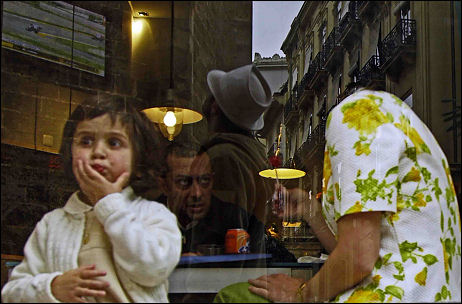
apparenlty a still from Lucrecia Martel’s La Mujer Sin Cabeza
Cute Prince With a Sword
The HD version of the trailer for The Chronicles of Narnia: Prince Caspian (Disney, 5.16) looks a lot better than the one here. Decent-looking special effects, I must say. Seems to have that old Mark Johnson schwing.
If Only…
Love the poster and teaser for Frank Miller‘s The Spirit (Lionsgate, 1.16.09). You know going into a Miller film that every frame will be luscious and immaculate (especially if you’re a fool for anachronistic noirish monochrome stuff, particularly when intense reds are thrown in for accentuation’s sake). You also know or strongly suspect that the story and the dialogue will probably feel cliched and shopworn and ho-hummish. I would be a shameless Miller groveller and a kiss-ass if he would only put half the energy into story and dialogue that he puts into visual composition.
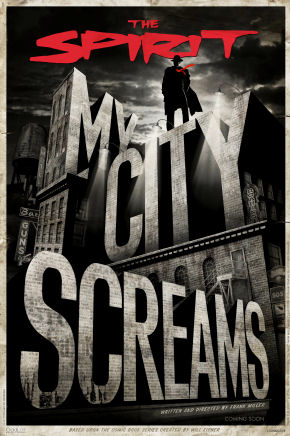
Sunday Afternoon
So what exactly is Sean Penn intending to do on-stage at the Coachella Music Festival on Sunday, 4.27 from 2:10 pm to 2:40 pm? If I were to hazard a guess, I’d say that Milk director Gus Van Sant wants to shoot Penn (in Harvey Milk guise) giving a speech to a big crowd. He doesn’t play in a band. Stand-up comedy?
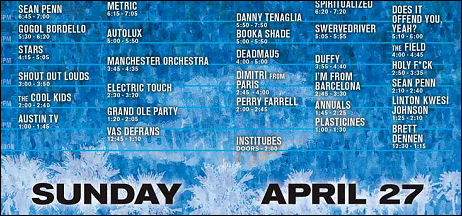
TFF Rip Job
The Tribeca Film Festival (4.23 to 5.4) “has always suffered comparisons to it’s older, more important siblings,” writes the N.Y. Observer’s Sara Vilkomerson.
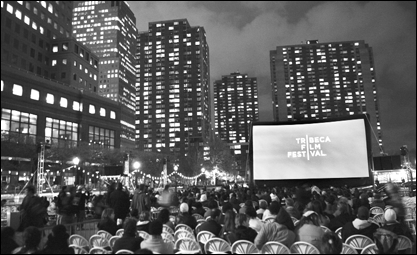
“It doesn’t have the old-world glamour of Cannes, the international marketplace hagglings at Toronto or Berlin, the late-night frenzied dealings and celebrity swagfest of Sundance or the elegant prestige found at Lincoln Center. It hasn’t even had a central location, what with theaters all over the city hosting screenings, and downtown itself a strange labyrinth of high-end restaurants and hotels.
“What Tribeca has had is a lot: hundreds of films; paparazzi-lined Hollywood-style premieres; family film and ESPN sports-themed programming; artist round-table discussions; outdoor ‘drive-in’ screenings; concerts; and audience-participatory events. (This year, director John Landis will host a 25th-anniversary screening of the epic video for Michael Jackson‘s Thriller, where audiences are invited to ‘learn the Thriller dance,’ get zombie-fied at a Thriller face-painting station, compete in a Michael Jackson look-alike contest or boogie at the Solid Gold Dance party.)
“Given the overwhelming confusion of choices (for the Thriller video alone, four separate activities?), Tribeca has consistently faced cries of complaint: It’s unmanageable, the venues are all over the place, ticket prices are too high, it doesn’t generate the kind of sales that make Variety headlines, it’s just too much. At seven years old, it’s time to ask: Can Tribeca grow up?
“‘I read somewhere that in New York the default mode is complaint,’ said Tribeca Film Festival artistic director Peter Scarlet.
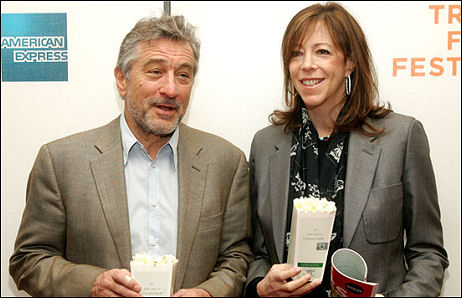
Robert De Niro, Jane Rosenthal
“When the New York Film Festival started in 1963, he pointed out, the New York press responded with a “reaction of distaste mixed with horror, not unlike that you saw with ’50s sci-fi movies when something landed from another galaxy. But gradually, humans being what they are, and the New York Film Festival being what it is — a pretty terrific film festival — New Yorkers actually relaxed their sphincters and got used to it. Now it’s an accepted part of the cultural fabric of New York.
“‘And then this other monster called Tribeca came along seven years ago and it was like, `Oh my God it’s so big!’ Which seems kind of ridiculous because New York is the town of everything bigger than everything else. I mean, nobody complained that the Empire State Building is too tall.’
“That’s true,” says Vilkomerson, “because the Empire State Building’s height is what allows us all to appreciate it. Tribeca has faced the opposite problem, being so big as to be impossible to appreciate.
“‘Everyone has their opinion,’ said Tribeca’s director of programming, David Kwok. ‘”I think when you come so strongly out of the gate, people want to criticize or have their own perspective of how it should be. Especially when it’s new. It’s almost natural instinct for some people — it’s easier to take a jab than to look at the positives. Whether it’s fair or not is not for me to say.’
“As one industry insider put it, ‘They’re a film festival on the defensive.'”

